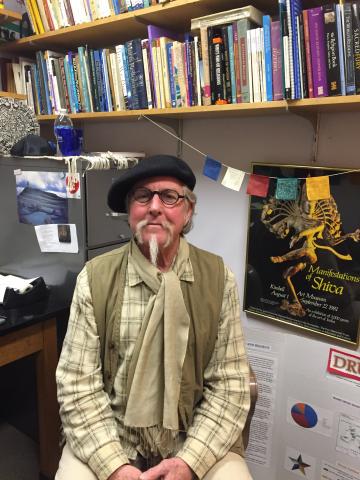Goodbye Mr. Secrest!
Gallery

- Tell me about your path and how it started on the World Religions path The World Religions course in HFC was begun in the early 1970s. The idea was that we needed to make available to our students in the liberal arts curriculum the knowledge of the teachings and practices of the major religious traditions.
- You often speak of your beautiful wife Misty, how does she factor in the faith you follow? Well, that’s a nice question to ask. My beautiful wife Misty is not religious, she doesn’t have a religious bone in her body. She thinks religions are a rather negative influence; she sees them creating more problems in the world than cures. She doesn’t really worry about the metaphysical issues that I find engaging but she is, at the same time, a beautiful soul. She keeps me alive by feeding me wonderful foods and taking good care of me physically. She respects that I am a teacher and this is what I do for Love has no religion, we’ll just leave it at that.
- Your beautiful wife Misty is an atheist, how do you share your spiritual beliefs with her? I think an atheist is somebody who follows no personal god but that doesn’t mean that they don’t love. You know, God is love. I don’t care so much about what somebody says, I consider what they do to be important, you know, it’s not talking the talk, it’s walking the talk.
- After 35 years-plus of teaching, why did you finally decide to retire? Real simple question: This is an all-consuming profession that I am in and it literally takes all my time when I’m teaching. I have collected 300 papers, it takes all my time. If I want students to write to me, I have to read their work. So every semester, I find myself with 150 little or big people that I have to enter into a personal relationship with and that’s my greatest joy. I’ve done it for forty years though – forty is a nice biblical figure – there are other things that I wish to accomplish. I want to be able to walk around the world, so my beautiful wife Misty and I are going walking. I’d like to go to Iceland, I’d like to go to Slovenia. One of the reasons I’m quitting now is because I’m spry enough to walk.
- What advice would you give to your students? Well, that’s a good question.
- What will you miss the most about teaching? Well, obviously, the students. I develop a personal relationship with each and every one of my students. I try to learn their names and I try to look at them the way their mothers did when they were born and appreciate every student as a beautiful, one of a kind, unique gift from god. And you know, that’s pretty special.
- What was the highlight of your career? Whoa, damn! Can I say Friday afternoons every week? That’s one highlight. Another highlight is, I’ve had the opportunity to do some serious sabbatical leaves which took me throughout the Middle East. I engaged my course material on the ground meeting the people and the places where these religions exist. It helped me enhance my ability to understand and try to communicate what I do. The highlight was to meet ten thousand people and have the opportunity to engage the things that matter most with them. And I consider the heart of religious studies to be dwelling upon contemplating and seeking to better appreciate the human cultural responses to the things that matter the most, like what life and reality are, what our place in the latter is and what we must do to fulfill the rest of our lives.
When they had a demand to teach more sections, they asked me to come and teach it. So, I started teaching it in 1980 and as the enrollment continued to grow in comparative religions, I was hired as a full-time faculty member in 1988. There were different faculty members teaching in the field and as such, there’s quite a quest in a highly culturally diverse area to understand each other.
Uhm, lighten up! I’d say, well, of course, what you have to do is follow your heart and search for what you really enjoy; find your passion. Everybody’s got a mission so, discover your mission and then execute it. Do what needs to be done to prepare yourself for such. Most of my students say, “I want to be a nurse” “I’m going into social work”” “I don’t know what I want to do”. So school is a time for you to really focus in and first of all, I want you to do what you need to do in order to feel fulfilled. Not just for money, but because that’s what your natural propensity is for. And then cultivate the discipline which is required in order for you to accomplish that. As your editor put in in her little editorial, “Don’t put it off!” don’t procrastinate too much.
